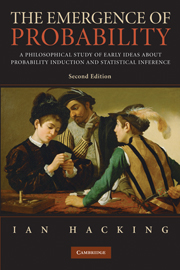 The Emergence of Probability
The Emergence of Probability Book contents
- Frontmatter
- Contents
- Introduction 2006
- 1 An absent family of ideas
- 2 Duality
- 3 Opinion
- 4 Evidence
- 5 Signs
- 6 The first calculations
- 7 The Roannez circle (1654)
- 8 The great decision (1658?)
- 9 The art of thinking (1662)
- 10 Probability and the law (1665)
- 11 Expectation (1657)
- 12 Political arithmetic (1662)
- 13 Annuities (1671)
- 14 Equipossibility (1678)
- 15 Inductive logic
- 16 The art of conjecturing (1692[?] published 1713)
- 17 The first limit theorem
- 18 Design
- 19 Induction (1737)
- Bibliography
- Index
12 - Political arithmetic (1662)
Published online by Cambridge University Press: 05 April 2013
- Frontmatter
- Contents
- Introduction 2006
- 1 An absent family of ideas
- 2 Duality
- 3 Opinion
- 4 Evidence
- 5 Signs
- 6 The first calculations
- 7 The Roannez circle (1654)
- 8 The great decision (1658?)
- 9 The art of thinking (1662)
- 10 Probability and the law (1665)
- 11 Expectation (1657)
- 12 Political arithmetic (1662)
- 13 Annuities (1671)
- 14 Equipossibility (1678)
- 15 Inductive logic
- 16 The art of conjecturing (1692[?] published 1713)
- 17 The first limit theorem
- 18 Design
- 19 Induction (1737)
- Bibliography
- Index
Summary
Statistics began as the systematic study of quantitative facts about the state. From 1603 the City of London kept a weekly tally of christenings and burials. Desultory records had existed earlier but a desire to know about the current state of the plague made it necessary to set out the figures in a more regular way. Most of the people ‘who constantly took in the weekly bills of mortality, made little other use of them, than to look at the foot, how the burials increased, or decreased; and among the casualties, what had happened rare, and extraordinary, in the week current’. Or so John Graunt [1662] tells us in the preface to his Natural and Political Observations upon the selfsame bills. He and William Petty – whose various essays on ‘Political Arithmetic’ make him the founder of economics – seem to have been the first people to make good use of these population statistics.
Why did no one do so earlier? It is plausible to suppose that inference from statistics evolved slowly because there were few data, but this is not the whole story. It is true that once Graunt had made plain the value of statistics, the capitals of Europe copied London and so data became more ample. For example, Paris started its tabulations in 1667, the year after Petty reviewed Graunt's book in the Journal des Sçavans [Petty, 1666]. But plenty of data were already in existence. Annuities had been an established method of national or local fund-raising for a very long time.
- Type
- Chapter
- Information
- The Emergence of ProbabilityA Philosophical Study of Early Ideas about Probability, Induction and Statistical Inference, pp. 102 - 110Publisher: Cambridge University PressPrint publication year: 2006
- 1
- Cited by


